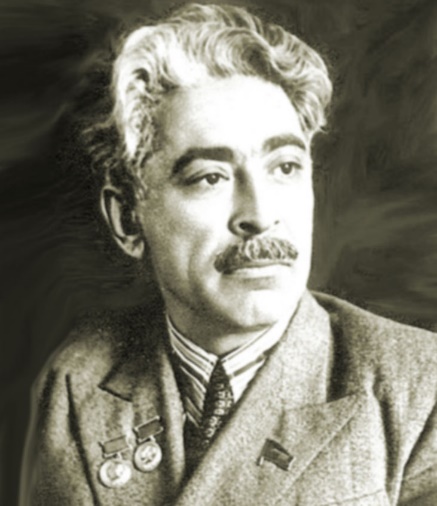Vakilov Samad Vurgun Yusif oglu
 |
Outstanding Azerbaijani poet Samad Yusif oglu Vekilov was born March 21, 1906 in the Yukhari Salahli village of Gazakh district. Childhood poet lived in his native village, got primary education in the Russian-Tatar school here.
In 1918, the eminent literary critic and educator Firidun Bey Kocharli translated Azerbaijani department of the Gori Teachers ' Seminary to Gazakh, thus organized Gazakh Teachers' Seminary. Among children enrolled in the school, was also Samad Vekilov (1902-1975). After graduating from the seminary (1924), Samad Vurgun started teaching Azerbaijani language and literature in Gazakh, Guba and Ganja. In 1920-1930 years, poet’s work attracted the attention of the literary world and the general readership. In the 1930s he has translated into Azerbaijani language novel in verse by Alexander Pushkin's "Eugene Onegin", Maxim Gorky's tale "The Girl and Death", an epic poem by Shota Rustaveli's "The Knight in the Panther's Skin", and poem of Nizami "Leili and Majnun". His first poems, he wrote, when he was in the seminary, and his first printed work, "Address to Youth" published in the newspaper "Yeni Fikir" in 1924, Tbilisi. In 1929, Samad Vurgun entered the Faculty of Literature of the Second Moscow University. Written by him in the years of political content lyric poems have been included in his first book, "The Oath of the poet", published in 1930. In 1934 poet published the book "Book of the soul", and book "Poems" in 1935. Only in 1935, Samad Vurgun wrote 7 poems and about 100 poems. Wrote them in 1934, the poem "Azerbaijan" is considered the pearl of Azerbaijani literature. In 1936-37-ies in addition to writing poems, the poet was also involved in translation work. So, he translated into Azerbaijani language of Pushkin's novel in verse "Eugene Onegin". "Medal of Pushkin" was awarded for the translation of the poet. During these years as a poet with great skill translated epic poem by Shota Rustaveli "The Knight in the Panther's Skin", for which he was awarded a diploma of the Central Executive Committee of the Georgian SSR. In the second half of 1937, Samad Vurgun wrote his immortal drama - "Vagif" for this drama the poet in 1941 was awarded the "Stalin Prize." In 1941, Samad Vurgun based on the poem of Nizami "Khosrov and Shirin" wrote his verse drama, "Farhad and Shirin". For this work in 1942 for the second time, he was awarded the "Stalin Prize." The period of the Great Patriotic War occupies a special place in the work of the poet. During the war, the great man-of-letter wrote more than 60 poems, some poems, including the poem "The Baku Dastan". At the last in 1943 in the US competition for the best work written on the anti-war theme, the poem of the poet "Mother’s advice” has received very high praise, and as one of the 20 most valuable works on this subject, was published in New York and spread among soldiers . Samad Vurgun was not only a well-known poet, but also a prominent scientist, organizer and theoretician. In 1945, Baku was created Society for Cultural Relations with Iran, the head of which was appointed Samad Vurgun. Prominent poet was among the founders of the Academy of Sciences of Azerbaijan established in 1945. Samad Vurgun was elected an active member of the Academy of Sciences of Azerbaijan SSR. In 1954 S.Vurgun was appointed Vice-President of the Academy of Sciences of Azerbaijan SSR and has invaluable merits in the development of national science and literature. In 1948, Samad Vurgun was a member of the World Congress of cultural workers in the Polish city of Wroclaw, after returning from the Congress wrote the poem "Negro’s dreams". The post-war period of creativity of Samad Vurgun was very fruitful. The poet is one of another wrote "Mugan" poem (1948), "Aygun" (1950-1951) and "Standard-bearer of the century" (1952). Samad Vurgun had great prestige in the USSR. Over the years he has been awarded the highest awards and medals of the USSR, was the favorite poet of the Soviet peoples. In 1954, at the Second All-Union Congress of Soviet Writers, Samad Vurgun presented the report "On the Soviet poetry”. Among the multinational peoples of the Soviet Union speech at the Congress on "The Soviet poetry" can be considered a very high score given to a Azerbaijan literature, and its representatives personally, Samad Vurgun. For his great services to the state a prominent Soviet and Azerbaijani poet Samad Vurgun was awarded the Order "Badge of Honor", medals "For the Defense of the Caucasus", "For Valiant Labor in the Great Patriotic War of 1941-1945." Samad Vurgun passed away on May 27, 1956. The poet is buried in the Alley of Honor. |
|
(1906-1956)
|

 Elm TV
Elm TV
 Photo
Photo
 Video
Video